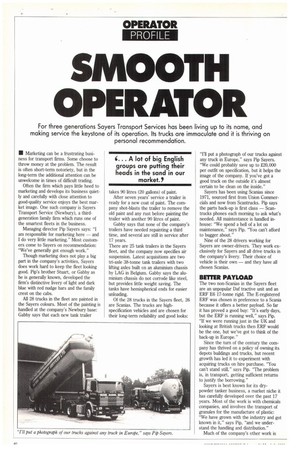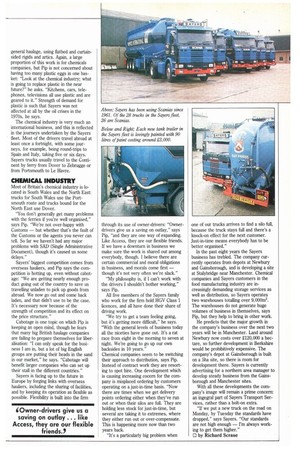SMOOTH OPERATOR
Page 42

Page 43

If you've noticed an error in this article please click here to report it so we can fix it.
For three generations Sayers Transport Services has been living up to its name, and making service the keystone of its operation. Its trucks are immaculate and it is thriving on personal recommendation.
A lot of big English groups are putting their heads in the sand in our market.,
IN Marketing can be a frustrating business for transport firms. Some choose to throw money at the problem. The result is often short-term notoriety, but in the long-term the additional attention can be unwelcome in times of difficult trading.
Often the firm which pays little heed to marketing and develops its business quietly and carefully with close attention to good-quality service enjoys the best market image. One such company is Sayers Transport Service (Newbury), a thirdgeneration family firm which runs one of the smartest fleets in the business.
Managing director Pip Sayers says: "1 am responsible for marketing here — and I do very little marketing." Most customers come to Sayers on recommendation: "We've generally got enough work."
Though marketing does not play a big part in the company's activities, Sayers does work hard to keep the fleet looking good. Pip's brother Stuart, or Gabby as he is generally known, developed the firm's distinctive livery of light and dark blue with red nudge bars and the family crest on the cabs.
All 28 trucks in the fleet are painted in the Sayers colours. Most of the painting is handled at the company's Newbury base: Gabby says that each new tank trailer takes 90 litres (20 gallons) of paint.
After seven years' service a trailer is ready for a new coat of paint. The company shot-blasts the trailer to remove the old paint and any rust before painting the trailer with another 90 litres of paint.
Gabby says that none of the company's trailers have needed repainting a third time, and several are still in service after 17 years.
There are 25 tank trailers in the Sayers fleet, and the company now specifies air suspension. Latest acquisitions are two tri-axle 38-tonne tank trailers with two lifting axles built on an aluminium chassis by LAG in Belgium. Gabby says the aluminium chassis do not corrode like steel, but provides little weight saving. The tanks have hemispherical ends for easier unloading.
Of the 28 trucks in the Sayers fleet, 26 are Scanias. The trucks are highspecification vehicles and are chosen for their long-term reliability and good looks: "I'll put a photograph of our trucks against any truck in Europe," says Pip Sayers. "We could probably save up to 220,000 per outfit on specification, but it helps the image of the company. If you've got a good truck on the outside it's almost certain to be clean on the inside."
Sayers has been using Scanias since 1971, sourced first from Union Commercials and now from Scantrucks. Pip says the parts back-up is first class — Scantrucks phones each morning to ask what's needed. All maintentance is handled inhouse: "We spend a hell of a lot on maintenance," says Pip. "You can't afford to bugger about."
Nine of the 28 drivers working for Sayers are owner-drivers. They work exclusively for Sayers and all drive trucks in the company's livery. Their choice of vehicle is their own — and they have all chosen Scanias.
BETTER PAYLOAD
The two non-Scanias in the Sayers fleet are an unpopular Daf tractive unit and an ERF E6 17-tonne rigid. The E-registered ERF was chosen in preference to a Scania because it offers a better payload. So far it has proved a good buy: "It's early days, but the ERF is running well," says Pip. "If we were running just in the UK and Looking at British trucks then ERF would be the one, but we've got to think of the back-up in Europe."
Since the turn of the century the company has thrived on a policy of owning its depots buildings and trucks, but recent growth has led it to experiment with acquiring trucks on hire purchase. "You can't stand still," says Pip. "The problem is, in transport, getting sufficient returns to justify the borrowing."
Sayers is best known for its drypowder tanker business, a market niche it has carefully developed over the past 17 years. Most of the work is with chemicals companies, and involves the transport of granules for the manufacture of plastic: "We have grown with the industry and got known in it," says Pip, "and we understand the handling and distribution."
Much of the company's other work is general haulage, using flatbed and curtainsided rigids and artics. Again, a large proportion of this work is for chemicals companies, but Pip is not concerned about having too many plastic eggs in one basket: "Look at the chemical industry; what is going to replace plastic in the near future?" he asks. "Kitchens, cars, telephones, televisions all use plastic and are geared to it." Strength of demand for plastic is such that Sayers was not affected at all by the oil crises in the 1970s, he says.
The chemical industry is very much an international business, and this is reflected in the journeys undertaken by the Sayers fleet. Most of the drivers travel abroad at least once a fortnight, with some journeys, for example, being round-trips to Spain and Italy, taking five or six days. Sayers trucks usually travel to the Continent by ferry from Dover to Zebrugge or from Portsmouth to Le Havre,
CHEMICAL INDUSTRY
Most of Britain's chemical industry is located in South Wales and the North East: trucks for South Wales use the Portsmouth route and trucks bound for the North East use Dover.
"You don't generally get many problems with the ferries if you're well organised," says Pip. "We're not over-happy with Customs — but whether that's the fault of the Customs or the agents you never can tell. So far we haven't had any major problems with SAD (Single Administrative Document), though it's caused us some delays."
Sayers' biggest competition comes from overseas hauliers, and Pip says the competition is hotting up, even without cabotage: "We are getting nearly enough product going out of the country to save us travelling unladen to pick up goods from abroad. We now go out and come back laden, and that didn't use to be the case. It's necessary now because of the strength of competition and its effect on the price structure."
Cabotage is one topic on which Pip is keeping an open mind, though he fears that many big British haulage companies are failing to prepare themselves for liberalisation: "I can only speak for the business I am in, but a lot of big English groups are putting their heads in the sand in our market," he says. "Cabotage will benefit larger companies who can set up their stall in the different countries."
Sayers is facing up to the future in Europe by forging links with overseas hauliers, including the sharing of facilities, and by keeping its operation as flexible as possible. Flexibility is built into the firm through its use of owner-drivers: "Ownerdrivers give us a saving on outlay," says Pip, "and they are one way of expanding. Like Access, they are our flexible friends. If we have a downturn in business we make sure the work is shared out among everybody, though. I believe there are certain commercial and moral obligations in business, and morals come first — though it's not very often we're slack."
"My philosophy is, if I can't work with the drivers I shouldn't bother working," says Pip.
All five members of the Sayers family who work for the firm hold HGV Class 1 licences, and all have done their share of driving work.
"We try to get a team feeling going, but it's getting more difficult," he says. "With the general levels of business today all the niceties have gone out. It's a rat race from eight in the morning to seven at night. We're going to go up our own backsides in 10 years."
Chemical companies seem to be switching their approach to distribution, says Pip. Instead of contract work they are resorting to spot hire. One development which is causing increasing cocern for the company is misplaced ordering by customers operating on a just-in-time basis. "Now there are times when we get delivery points ordering either when they've run out or when their silos are full. They are holding less stock for just-in-time, but several are taking it to extremes, where they either run out or over-compensate. This is happening more now than two years back.
"It's a particularly big problem when one of our trucks arrives to find a silo full, because the truck stays full and there's a knock-on effect for the next customer. Just-in-time means everybody has to be better organised."
In the past eight years the Sayers business has trebled. The company currently operates from depots at Newbury and Gainsborough, and is developing a site at Stalybridge near Manchester. Chemical companies and Sayers customers in the food manufacturing industry are increasingly demanding storage services as well as distribution, so Sayers operates two warehouses totalling over 9,000m2. The warehouses do not generate huge volumes of business in themselves, says Pip, but they help to bring in other work.
He predicts that the major growth in the company's business over the next two years will be in Manchester. Land around Newbury now costs over 2120,000 a hectare, so further development in Berkshire would be prohibitively expensive. The company's depot at Gainsborough is built on a 5ha site, so there is room for development there. Sayers is currently advertising for a northern area manager to develop steady business from the Gainsborough and Manchester sites.
With all these developments the company's image will remain a prime concern: an ingegral part of Sayers Transport Services, rather than a bolt-on extra.
"If we put a new truck on the road on Monday, by Tuesday the standards have dropped,' says Sayers. "Our standards are not high enough — I'm always working to get them higher."
by Richard Scrase
































































































































